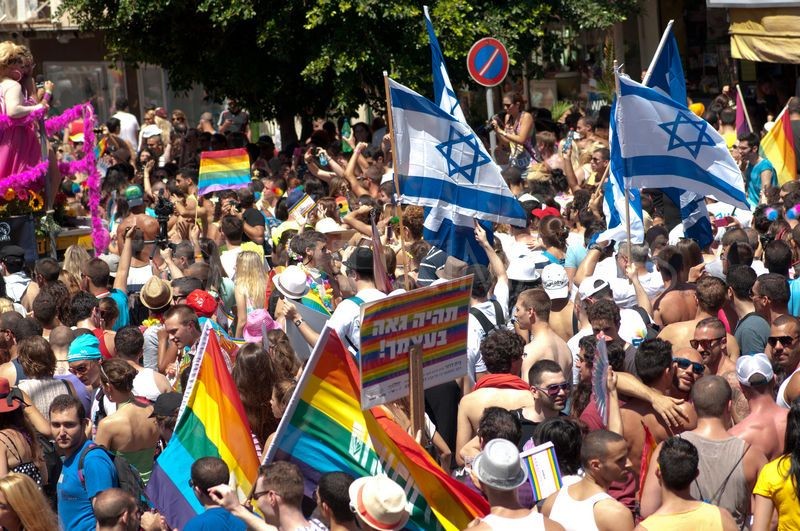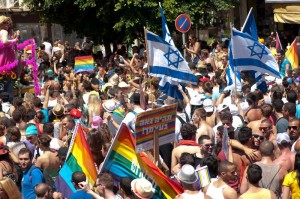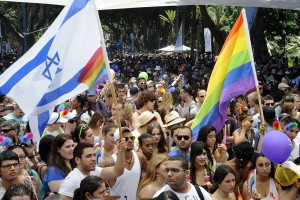Jaynie Levinson — Connecting Jewish Young Adults

What Can Gay Cincinnati Learn From Gay Tel Aviv?
 Tel Aviv, Israel has been voted one of the best gay cities in the world. Yes, Tel Aviv. In the heart of the Middle East. In a country where the Rabbinate (religious institution) still controls many laws, including the institution of marriage (gay marriage is illegal, although same-sex marriages performed outside of the country are observed). Tel Aviv Pride is the biggest in all of Asia. ASIA!!!
Tel Aviv, Israel has been voted one of the best gay cities in the world. Yes, Tel Aviv. In the heart of the Middle East. In a country where the Rabbinate (religious institution) still controls many laws, including the institution of marriage (gay marriage is illegal, although same-sex marriages performed outside of the country are observed). Tel Aviv Pride is the biggest in all of Asia. ASIA!!!
As we work to make Cincinnati a more diverse, inclusive city and attract Jewish young people here, becoming an LGBT friendly city is key to that. That’s why next week, I’m headed to Israel to explore what we can learn to make Cincinnati a better LGBT city. While Cincinnati has come a long way in recent years to become more inclusive, our city’s history has allowed space for much opportunity and creation in this area.
In 1993, the voters of Cincinnati approved Article XII to the city’s charter, prohibiting the city from offering protection to people “because of homosexual, lesbian or bisexual orientation.” According to an article in Cincy Magazine, the charter amendment tarred Cincinnati nationally as a place unfriendly to the Lesbian, Gay, Bisexual and Transgender (LGBT) community and led to an exodus of gays and lesbians.
This law was repealed by voters in 2004, but because of laws like this, Cincinnati fell behind almost every major American city when it comes to attracting an LGBT population. A study highlighted in the Advocate this year listed Cincinnati as 45th out of 50th in percentage of LGBT population in the largest 50 American cities.
However, things are changing in the Queen City. Openly gay city councilmember Chris Seelbach has done a lot to promote and make the LGBT population visible. The New York Times recently highlighted Cincinnati’s shift, as the plaintiff in the gay marriage case before the Supreme Court, awaiting a decision this summer, is a Cincinnatian.
When I moved back to the city from NYC as an openly gay person, I immediately noticed how Cincinnati was lacking when it came to creating a vibrant, LGBT people. Not only did I see the need for change, but so did the Jewish Federation of Cincinnati, with our Cincinnati2020 strategic plan of becoming a more welcoming Jewish community, including LGBT families and individuals in the process.
Around the same time, I noticed that Tel Aviv , Israel, was gaining worldwide attention for how it’s such a fantastic city for LGBT people, not just Israelis but as an international tourist destination. In 2011, Tel Aviv was rated the best gay city in the world! We also brought in openly gay city councilman, Yaniv Waizman, to speak as part of our Israelity series. Waizman spoke about how Tel Aviv became an incredible city for gay residents and tourists mainly through public relations and marketing. This ignited a conversation about how the Jewish community can take the lead and truly make Cincinnati a place where LGBT people want to live and build their lives!
, Israel, was gaining worldwide attention for how it’s such a fantastic city for LGBT people, not just Israelis but as an international tourist destination. In 2011, Tel Aviv was rated the best gay city in the world! We also brought in openly gay city councilman, Yaniv Waizman, to speak as part of our Israelity series. Waizman spoke about how Tel Aviv became an incredible city for gay residents and tourists mainly through public relations and marketing. This ignited a conversation about how the Jewish community can take the lead and truly make Cincinnati a place where LGBT people want to live and build their lives!
So, we’re going to Israel! By “we,” I mean I’m traveling with Ryan Messer, President of the Over-the-Rhine Community Council, founder of the Believe in Cincinnati movement, and influential in the LGBT community in Cincinnati, and Karen Aronoff, former chair of the local HRC chapter and gay rights leader. We’re going to the 40 years of Pride Conference. According to LGBT Weekly, “for two and a half days, leaders from around the world will gather in the heart of Tel Aviv, home to a dynamic and vibrant LGBTQ community, to inspire and strengthen each other, build skills and networks, and celebrate 40 years of LGBTQ progress in Israel, all culminating with the ever-fabulous weekend of Tel Aviv Pride, a celebration that attracts 150,000 people from across the world.”
We’ll all be blogging and posting on social media during the trip (make sure you follow @CincyJews on Facebook, Twitter, and Instagram!). When we get back, we plan on working with LGBT leaders in the city to make some real change in the ways Tel Aviv has.
Cincinnati has learned quite a lot from a special partnership we have with Netanya, Israel. We have multiple people to people exchanges each year, specializing in everything from teens to social workers to Holocaust educators. We’ve found we can learn as much from Israeli society as they can learn from ours, which makes our connections to Israel stronger and more meaningful. It is our hope that this experience with Tel Aviv will help spark us to continue to make Cincinnati a better and more inclusive city.

